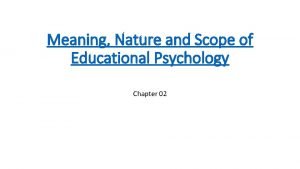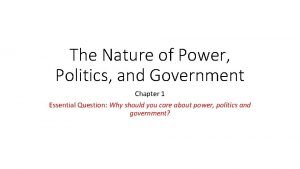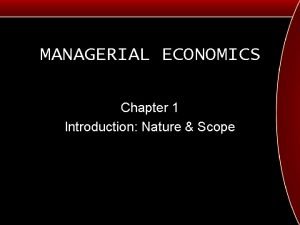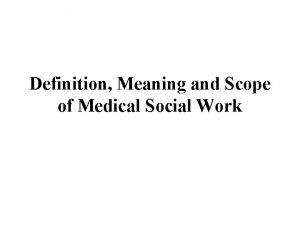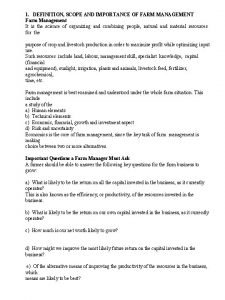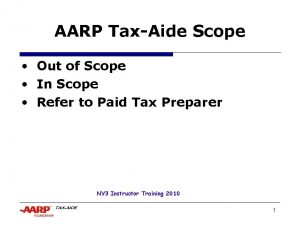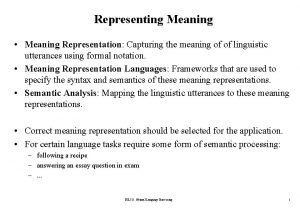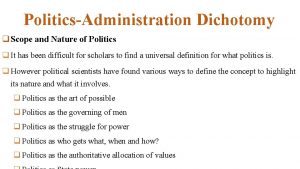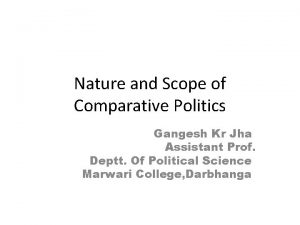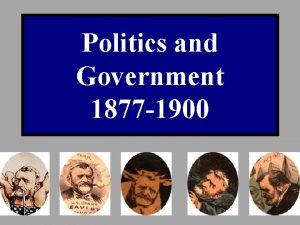International Politics meaning nature and scope According to














- Slides: 14

International Politics- meaning, nature and scope According to Hans Morgenthau International Politics is the struggle for power between states in the international system. I. P. can be defined as a study of those aspects of International Relations which include the conflicts and controversies at international level and their resolution.

Nature of International Politics • • • Sovereign States are chief actors Protection of National Interest is the objective International Politics is the struggle for power Power is both a means and an end in I. P. Conflicts are a condition of I. P. is a process of conflict resolution among nations I. P. is a continuous process I. P. is a behavioral study I. P. is an inter-disciplinary study It is a scientific and analytical study

Scope of International Politics • • • Study of state systems Study of relations among states Study of National Interests Study of National Power Study of International Law Study of Foreign Policy Study of International Organizations Study of geopolitics Study of Conflict Management and Conflict Resolution

• • • Study of War and Peace Study of Ideologies Study of Nationalism, Colonialism and Imperialism Study of Policy Making Study of National Character Study of Disarmament Study of issues related to Environmental protection Study of issues related to Human Rights Study of role of Economic factors Study of demographic factors Study of problem of terrorism

International Politics- Realist and Idealist Approaches • This chapter looks at International Politics through the lens of two theoretical principles viz. , • Realism • Idealism

Basic Assumptions of Realist Approach • History is a witness that human nature is sinful, wicked and selfish • Human nature always lusts for more power • I. P. is a struggle for power and it is a war of all against all • Every nation uses power to achieve its national interests and national interests are always defined in terms of power acquisition • The law of ‘self preservation’ governs the behavious of all states

• The basic characteristic of I. P. demands that no nation should trust other nations for its self preservation • To face possible enemies, every nations should give priority to defense preparedness • Peace can be preserved only by management of power through such devices as Balance of Power, Collective Security, World Government, Diplomacy, Alliances etc.

Characteristics of Realist Approach • • Based on Realism Rivalry, Strifes and Struggle for Power are Natural Importance of Diplomacy No importance to Ideology Close relation between morality and reality Reason based approach Significance of National Interests

Morgenthau’s Realist Approach and Six Principles • Hans J. Morgenthau is considered the chief supporter of theory of Political Realism of International Politics • In his book ‘Politics Among Nations’ Morgenthau has built is Realist theory on ‘Six Principles of Political Realism’

• First Principle • Objective Laws of Human Nature • Facts of Human Relations • Second Principle • National Interest defined in terms of power • National Interests can be secured only through national power • Less importance to ideology • National interests and national power determine the foreign policy

• Third Principle • Dynamicness of Interests • Continuous evaluation of National Interests and national power • Fourth Principle • Abstract moral principles cannot be applied to politics • Prudence alone can be the guide

• Fifth Principle • Difference between the Moral Aspirations of a Nation and the universal moral principles • Nations always try to secure national interests and not moral principles • Sixth Principle • Autonomy of International Politics

Characteristics of Idealist Approach • • Man is good by nature Opposition of wars Power is not central to international relations Value based approach Rejection of Totalitarianism Faith in International Organizations Supporters of the establishment of World state Emphasis on education, reason and science

National Power force and influence • Power is different from • National power is both a means and an end • National power is the ability to secure national interests • National power is dynamic • It varies from nation to nation
 Define educational psychology
Define educational psychology Nature and scope of public administration
Nature and scope of public administration The nature of power politics and government
The nature of power politics and government Meaning and scope of international finance
Meaning and scope of international finance Politics and international relations bsc
Politics and international relations bsc Nature and nature's laws lay hid in night
Nature and nature's laws lay hid in night Scope of physics
Scope of physics Traditional approach of finance function
Traditional approach of finance function What is marketing nature scope and importance
What is marketing nature scope and importance Nature and scope of managerial economics
Nature and scope of managerial economics Explain the nature and scope of channel management.
Explain the nature and scope of channel management. Social work definition
Social work definition Nature of risk management
Nature of risk management Explain the nature and scope of channel management
Explain the nature and scope of channel management Farm management scope
Farm management scope
